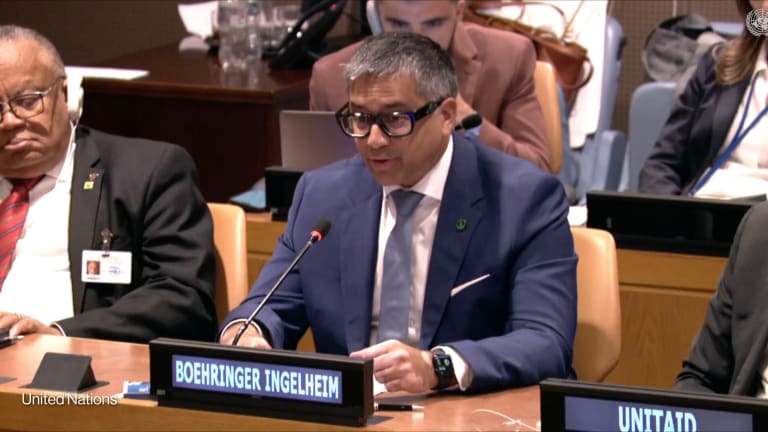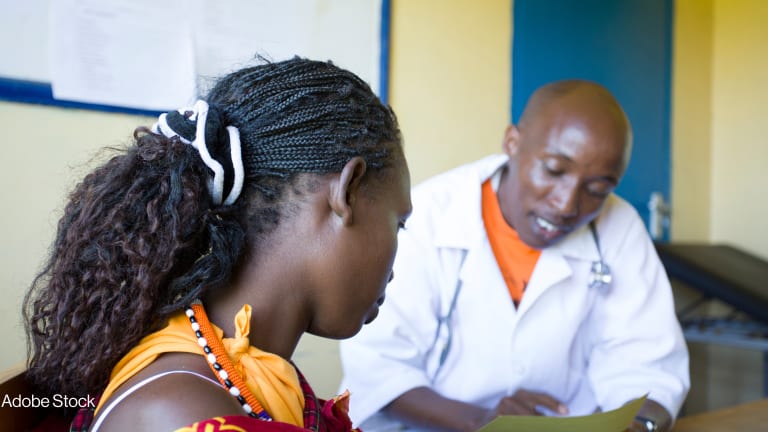
When it comes to tackling the hepatitis C virus, or HCV, there are lessons the global health community can learn from Mongolia, said Dr. Amgalan Byambasuren, head of the department of gastroenterology of the general hospital in Arkhangai province, a remote province in northern Mongolia, and lead of the Liver Disease Free Arkhangai Project.
A bloodborne virus often contracted through exposure to infected blood — perhaps through unsafe injection practices or unscreened blood transfusions — HCV newly infects around 1.5 million per year. According to the World Health Organization, around 290,000 people died from the virus in 2019, even though antiviral medicines can cure 95% of cases.
With a cure available, WHO wants to eliminate hepatitis C as a public health threat by 2030. To do so means reaching target milestones such as diagnosing 90% of all infections and getting 80% of those diagnosed on treatment by 2030.
In Mongolia, where hepatitis B and C are the second leading causes of death, “we are actually doing even better,” Byambasuren said.
Through the Liver Disease Free Arkhangai Project — which is supported by Gilead Sciences and run by the Mongolian government and Arkanghai Province Health Department — Arkhangai has reached a 98% diagnosis rate and 96% treatment rate.
Speaking with Devex, Byambasuren explained how the province has been able to achieve such success and what lessons others can learn from their work in eliminating HCV worldwide.
This conversation has been edited for length and clarity.
How did your province achieve such high numbers for diagnosis and treatment rates?
This project has been running for at least five years now. It started in 2016 when we conducted mass screenings for HCV among people aged 40 to 65, a priority population given their vulnerability. [If not diagnosed and treated] the virus can cause cancer or liver cirrhosis. By the end of 2017, all Arkhangai residents aged 40-65 had been screened and we began screening people aged 15-40. In 2018, we began diagnosing and treating. By August 2019, almost all people who tested positive and confirmed a diagnosis of HCV were cured.
“The challenges [we faced] were around human resources and information. Human resources are always needed. They inform the people who have the disease and those who don’t.”
— Dr. Amgalan Byambasuren, head of the department of gastroenterology, General Hospital of Arkhangai province, MongoliaHere’s how we did it. In Mongolia, we have 21 provinces, and each province has a county. In these counties, we have our smallest unit of government elected by the people, not appointed. Our first tactic was to reach people by phone for testing. Together, we called everyone in the community older than age 40.
One challenge though is that, in Mongolia, most patients are herd people [and] focused on their communities. They live in nature. They care about their herd, they care about their family, they don’t care about themselves. They don’t care about most other things. Knowing this, we asked the herd people to work in groups of 10. We asked them to appoint one person in each group as a leader who would organize visits for testing, medical exams, and getting medication. The doctor would have a private meeting with each and every individual in those teams to tell them about their diagnosis, the disease, why it is causing trouble, and what could happen without treatment. The group leader also has an important role to play in adherence to treatment for each of the team members.
One pack of pills is quite expensive in Mongolia, so if patients do not take their pills and adhere to treatment, it’s a waste of money, energy, and time. That’s why we decided to work with volunteer leaders who can check if the treatment is being taken by those who have tested positive in the community. Those people must take the pills for three or six months, depending on their liver disease.
Before we started the project, only 22% of those diagnosed knew that they had the virus [but] the doctors were well-prepared, informed, and they collaborated. The patients then looked at the first few people who were going through this project and as they became healthier it motivated more people [to get tested]. Direct-acting antivirals and HCV medicines are highly effective.
What do you think are the biggest challenges in reaching WHO’s global hepatitis C elimination targets and how can these be overcome?
The challenges [we faced] were around human resources and information. Human resources are always needed. They inform the people who have the disease and those who don’t.
Another challenge for us is that the diagnostic process of this disease is expensive. However, we worked to have insurance companies cover the tests — PCR tests for the virus, blood tests for the liver, and ultrasounds for the patients. PCR testing is quite expensive and was not originally covered by health insurance. However, the medicine was free for the patients thanks to the Gilead project.
What advice do you have for how other countries can tackle HCV?
Number one, a set policy must be implemented. It might consist of many points, but I would like to emphasize just a few of them starting with the organization or structure of the health care system. In our case, infrastructure and how the Ministry of Health works is one of the important components. [These affects how you] deal with contacts, communicate with the ministry, how they provide support, and what kind of support they give. For example, statistical information.
The second thing to note is that not every individual has enough money to deal with the disease so health insurance is important. We had a challenge in this area, and so we requested that the national insurance cover the treatment pills. Of course, some countries have much better insurance policies in place, but some countries have weaker systems.
Third, the public must be educated. They must know about the disease. Part of our program is to educate the community through classes and private meetings. We put up a big billboard — bigger than the ones in Times Square, [New York City] — in the center of the province where we constantly run educational information, including a picture of myself so everyone in the province knows who I am. Yes, I am a doctor, but I specialize in liver disease, so people see my face and think “oh they must be talking about a serious issue.” Hopefully, then they start paying attention and will call the hospital.
We also have a Facebook page and chat to promote upcoming educational events. We set up tents to do outreach in the town center one or two weekends per month to raise awareness about the health risks associated with HCV and hepatitis. These things have helped a lot in achieving our goal.
What is the next step in terms of scaling this work?
We are currently conducting research to compare quality of life between HCV patients who receive treatment and those who do not receive treatment, in terms of socio-economic impact for the health sector, family, and personal life.
The next level of this project is called Cancer Free Arkhangai Aimag. It’s already ready. The policy is written, and we will start to roll it out when the time is right. Within this project, we focus on hepatitis B and D as well as early detection of cancer through the screening facility in the province center and expansion of the information and counseling.








